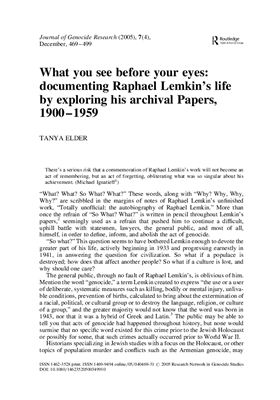An Article. Joual of Genocide Research 7(4), December 2005, pp.
469–
499. Language: English.
"Historians specializing in Jewish studies with a focus on the Holocaust, or other topics of population murder and conflicts such as the Armenian genocide, may know of Lemkin, but rarely consult his archival papers. A lawyer may know of his name through his writings on inteational law or currency exchange or possibly from the strong opposition by the American Bar Association to treaties such as the one that Lemkin produced out of the UN, the Convention for the Prevention and Punishment of Genocide. A psychologist, sociologist, or anthropologist who studies the cause and affect of mass murder may know of him in regards to those areas were his studies of the history of genocide and these disciplines might converge, but then again, probably not. Possibly a political scientist studying the efficacy of grassroots campaigns like the one Lemkin undertook to persuade over 58 countries to ratify an inteational treaty such as the Convention? Maybe a painter or rose cultivator might know of books he wrote on these subjects? There is no clue to these books in his archival documents, though he wrote on both subjects in his early years. No full-length biography of meaning, besides that of a Holocaust revisionist, has yet been written about him. However, without Lemkin, we would not be able to name, let alone comprehend, what Winston Churchill called 'a crime without a name'." (an excerpt from the article)
499. Language: English.
"Historians specializing in Jewish studies with a focus on the Holocaust, or other topics of population murder and conflicts such as the Armenian genocide, may know of Lemkin, but rarely consult his archival papers. A lawyer may know of his name through his writings on inteational law or currency exchange or possibly from the strong opposition by the American Bar Association to treaties such as the one that Lemkin produced out of the UN, the Convention for the Prevention and Punishment of Genocide. A psychologist, sociologist, or anthropologist who studies the cause and affect of mass murder may know of him in regards to those areas were his studies of the history of genocide and these disciplines might converge, but then again, probably not. Possibly a political scientist studying the efficacy of grassroots campaigns like the one Lemkin undertook to persuade over 58 countries to ratify an inteational treaty such as the Convention? Maybe a painter or rose cultivator might know of books he wrote on these subjects? There is no clue to these books in his archival documents, though he wrote on both subjects in his early years. No full-length biography of meaning, besides that of a Holocaust revisionist, has yet been written about him. However, without Lemkin, we would not be able to name, let alone comprehend, what Winston Churchill called 'a crime without a name'." (an excerpt from the article)

